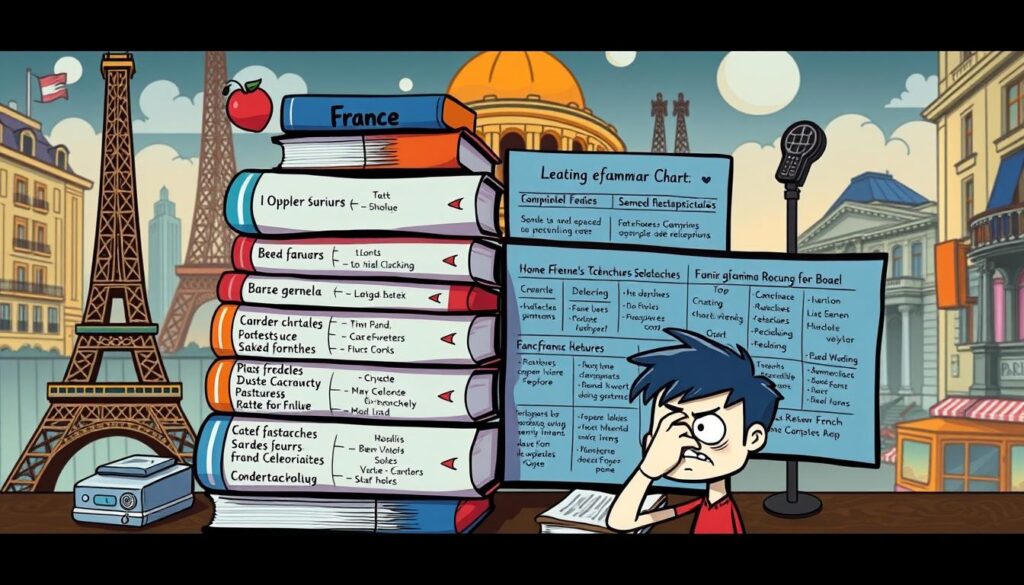To ace your french language certification, it’s key to know about the DELF and DALF exams. They are issued by the French Ministry of Education. They help prove your French skills. Getting ready means choosing the right test preparation tips and french test resources.
If you’re facing the DELF’s levels from A1 to B2, or DALF’s C1 and C2, have a strong plan. You need to focus on listening, reading, writing, and speaking. This is vital for test readiness. Success comes from using study materials that improve these key areas.
For anyone aiming for French certification, finding good advice is key. Language Yard offers great tips for self-learners. They cover everything from grammar to conversation. This makes studying less scary and more effective.
Understanding the DELF and DALF Exam Structure
Getting ready for the DELF and DALF exams means knowing their setup. This matters a lot if you’re aiming to get better in French. These exams are recognized all over by schools, jobs, and even governments. They test your French language skills in many ways.
Key Components of DELF and DALF Exams
The DELF and DALF exams have different parts that check how well you listen, read, write, and speak. They go from level A1, for beginners, to C2, for the advanced learners. The DELF exams are for levels A1 to B2. They are for those who are just starting or are at an intermediate level. The DALF is for the more advanced students, covering levels C1 and C2.
Each level of these exams focuses on certain language skills. For beginners at A1, there might be simple quizzes. For the most advanced level, C2, the tasks are more complicated. The time it takes to do these varies too. A1 tests last 1 hour and 20 minutes, but C1 tests go up to 4 hours. This helps you plan your study time better, knowing what each level expects from you.
The Importance of Knowing Exam Formats and Expectations
It’s key to know the specifics of the DELF and DALF exams. They’re set up to test different things at each level. Knowing the details can help you study smarter. For instance, the DALF C1 is a long, 4-hour test. It includes many kinds of tasks, like writing and understanding texts. This knowledge lets you prepare in a focused way.
Scheduling your study time based on these details can make exam day go smoother. You’ll have a plan for tackling the different sections. This approach gets you closer to mastering French.
Strategies to Create a Personalized Study Plan
For success in French, creating a custom study plan is key. You need effective time management and to understand your learning styles. Whether you want basic skills or professional fluency, your study schedule should reflect your goals and needs.
Begin by setting clear, achievable goals with the OKR method. It keeps your study motivation high with specific, measurable objectives. For instance, aim to learn 50 new words a week or do 15 minutes of vocabulary exercises daily.
Vary your study activities to improve listening, speaking, reading, and writing. By using different methods, you avoid boredom and remember more. Techniques like spaced repetition are great for mastering vocabulary and grammar.
Changing your study plan to include revision strategies like grammar drills and vocabulary flashcards can make you more efficient.
Fit your study times into your daily schedule. If you work 9-5, use lunch breaks or evenings for study. Regularly using the language helps with retention and improving skills.
Below is an example of how to set up your study times:
| Time of Day | Activity | Goal |
|---|---|---|
| Morning | Review Vocabulary | Enhance word recall |
| Lunch Break | Listening Practice | Improve comprehension skills |
| Evening | Speaking with a Tutor | Practice conversation |
| Weekend | Grammar and Writing Exercises | Master complex structures |
Design a study schedule that fits your life and likes. Use various materials and methods like French movies or music, and practice tests for exams. This way, your study is fun and productive.
Remember, success in language learning comes from ongoing practice and being flexible. Adjust your plan as you learn what works best for you.
How to Study for a French Test with Practice and Repetition
To ace French tests, mix practice tests, listening exercises, speaking practice, and review sessions. Doing these activities often helps grow your French vocabulary and fluency. Here are steps and tips to prepare effectively.
- Practice Tests: Taking practice tests often gets you used to the exam’s layout and timing. They mimic the real test setting, lowering anxiety and boosting scores.
- Listening Exercises: Use appropriate audio in your studies. It hones listening skills and understanding of quick French speech.
- Speaking Practice: Practice speaking with native speakers or use language apps. This improves pronunciation and builds confidence in conversations.
- Review Sessions: Reviewing material over increasing intervals, known as spaced repetition, helps cement memories and recall.
It’s crucial to use different study methods. Mixing content types and repetitive practice tells your brain to remember this new info. You should review the same French words many times over days, then sporadically over weeks.
| Component | Description | Benefit |
|---|---|---|
| Practice Tests | They mimic real exams | Boosts familiarity and eases test worries |
| Listening Exercises | Involves media like songs and podcasts | Improves spoken French comprehension |
| Speaking Practice | Talking with native speakers or via apps | Increases confidence and accurate pronunciation |
| Review Sessions | Repeating studied material methodically | Greatly helps with remembering over time |
Adding context and emotions to your French studies boosts memory. Connect your learning to personal experiences or use vivid imagery for vocab. Also, diving into French culture, as experts recommend, deepens language appreciation. It makes learning fun and thorough.
To master French, practice regularly, use various learning forms, and repeat strategically. Adding these to your routine gears you towards language success.
Mastering French Grammar: Foundational to Fluency
Starting your French learning journey? Understanding french grammar deeply is essential. It includes a wide range of grammar rules, like tenses and sentence building. First, learn how regular verbs follow patterns and tackle the challenge of irregular verbs, which need special ways to memorize.
Improving your writing skills in French depends on your grammatical knowledge. You need to know how subject, verb, and object work together in sentences. For instance, French sentences often follow the subject-verb-object order. However, the language allows you to rearrange parts for emphasis.
To get better at grammar, practice is key. Using language apps and flashcards can really help. They boost vocabulary and teach you to use new words correctly.
- Practicing regularly helps you remember grammar better.
- A tutor or language exchange can improve your speaking quickly, with more practice leading to better skills.
Different factors affect how well you learn:
| Learning Component | Impact on French Mastery |
|---|---|
| Gender Agreement | Knowing how genders agree between nouns, adjectives, and articles helps with reading and speaking. |
| Verb Conjugation | Learning both regular and irregular verbs is important for correct sentences. |
| Memorization Techniques | Using tools like Anki or Duolingo makes remembering complex rules easier. |
| Dialogue Practice | Talking regularly builds confidence and grammar use in real conversations. |
For more tips on learning French effectively, check out study guides for the French language.
To wrap up, getting fluent in French needs focused study and using grammar well. Focus on the basics of grammar, practice speaking, and use good resources. Remember, learning French grammar is more than memorizing. It’s about using the rules every day to improve how you understand and speak French.
Immersion and Using Native Resources to Boost Listening and Speaking Skills
Starting your journey to improve French listening and speaking with language immersion is highly recommended. Listening to native speakers teaches you the sounds and styles of different French dialects. It also helps you learn common phrases. Trying materials that you understand about 75% of helps avoid frustration while improving. This way, you learn language naturally, step by step.
YouTube is great for beginners with channels like La prof Elisabeth and Français avec Pierre. They offer educational videos, which are very helpful. To enhance your learning, watch French TV shows or do a language exchange. You can also label items at home in French or use French on your devices. Every interaction with French improves your pronunciation practice and cultural knowledge. For more tips, check out this guide.
What makes you better at a language is active involvement. Join meetings with French people or use online platforms to talk with speakers globally. Such conversations help with pronunciation, listening skills, and using language in real-life settings. Use learning tools that are fun and track your progress with a journal and clear goals. This approach helps perfect your French for enjoyment and preparing for tests.


